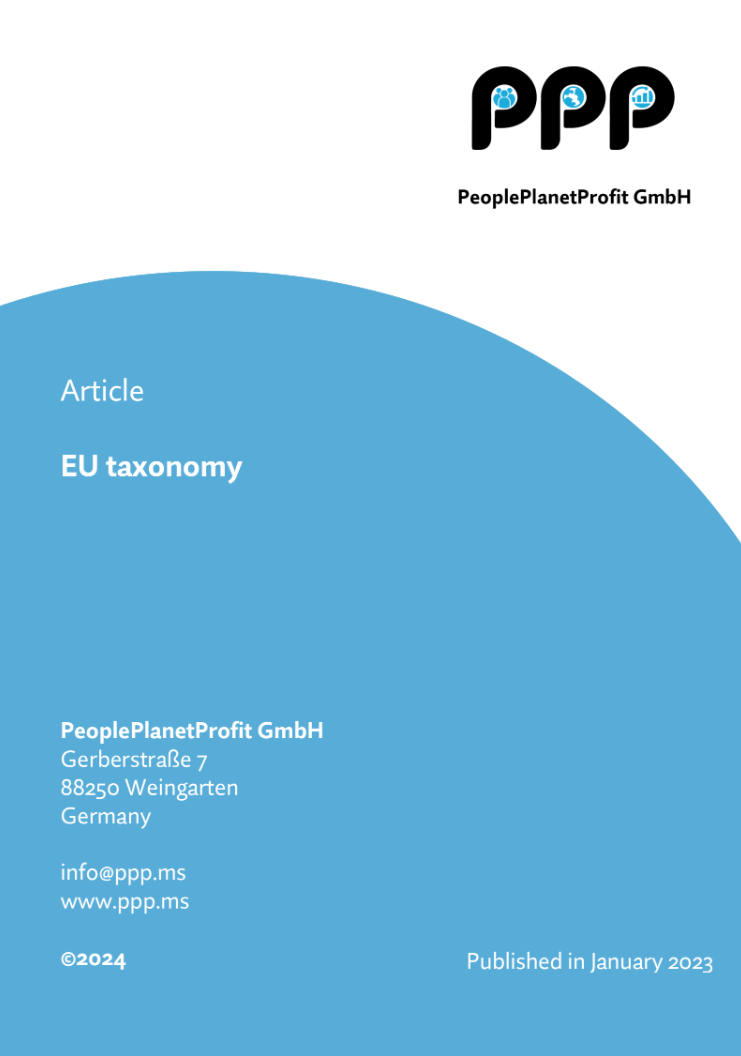What is corporate social responsibility?
Corporate Social Responsibility (CSR) refers to the commitment of companies to act responsibly and make positive contributions to society and the environment that go beyond purely business objectives. It integrates the principles of corporate citizenship, whereby companies are seen as part of society that actively contribute to social welfare.
At the same time, CSR can include the preparation of sustainability reports, which enable transparent documentation and communication of a company’s social and environmental performance to its stakeholders. CSR also offers increased legal certainty due to Directive 2014/95/EU (NFRD) and Directive (EU) 2022/2464 (CSRD), in force since 2024, on the mandatory declaration of non-financial objectives.
Why is CSR relevant to business?
Corporate Social Responsibility (CSR) is of great importance for companies, as it goes far beyond traditional business objectives. CSR makes a positive contribution to society and the environment. The integration of CSR practices helps companies to fulfill their responsibility towards society, which leads to an improved reputation and credibility. CSR also promotes long-term sustainability by helping to minimize risks and strengthen stakeholder trust.
In addition, CSR initiatives enable companies to achieve efficiency gains and cost savings, which increases their competitiveness. Ultimately, CSR helps to improve the working atmosphere and promote employee satisfaction and loyalty, which in turn increases the company’s productivity and innovative strength.
All the advantages of CSR at a glance
Our services
PPP offers comprehensive advice and support in the development and implementation of CSR strategies. We help companies to define their CSR goals, design effective programs and measure and communicate their sustainability performance.
- Support in the development and implementation of sustainability strategies
- Support with the introduction of CSR in accordance with internationally recognized standards
- Further development of existing systems for the integration of sustainability aspects
- Product and process optimization taking sustainability criteria into account
- Process analyses to identify potential for improvement
- Materiality analyses
- Stakeholder surveys
- Identification of sustainability goals
- Development of a management plan
- Key figure management
- Provision of tools for measuring and monitoring sustainability performance
- Support in communicating sustainability performance to stakeholders and the public
- Climate risk assessment
- Gap analyses (previous sustainability work is compared with the new requirements, e.g. ESRS)
- Support in the collection of relevant data and key figures
- In cooperation with our partners:
- Sustainability report preparation
- Layout and design
Unique advantages with PPP
Our approach is customized and based on a deep understanding of the specific needs and challenges of each company. We offer expertise in all areas of CSR, from strategy development to reporting.
- Fast turnaround: Thanks to state-of-the-art software systems, we deliver results in record time.
- International team: Our global team is at your side for all CSR-related questions and projects.
- Industry expertise: Our team has in-depth knowledge of sustainability and reporting and can draw on extensive experience in various industries.
- Customized solutions: Every company is unique, and therefore we offer customized and individual solutions that meet your specific needs.
- Efficiency and time savings: Through standardized templates, we help you speed up the preparation process and use your resources more efficiently.
- Continuous support: We are your long-term partner for CSR. Our support does not end with implementation, but also includes ongoing support in the further development and optimization of your CSR strategy.
- Improved sustainability practices and a strengthened image: Improved sustainability practices can strengthen the image of the brand and the company. We also help you to use the findings for your marketing strategy.

EU Taxonomy - ArticleSend download link to: |
Free initial consultation
Are you ready to achieve your CSR goals and make a positive contribution? Contact us for a free initial consultation.
Patrick Wortner
Partner | MBA and Eng., Dipl.-Ing. (FH)
References/Best Cases
polyschaum Packtechnik und Isoliermaterial GmbH
Materiality analysis in accordance with ESRS, sustainability report in accordance with GRI and Code of Conduct
The three areas of responsibility of CSR
CSR is based on three pillars, which together form the basis for sustainable development:
- Environmental responsibility: this area focuses on environmental protection and the reduction of companies’ ecological footprints. Measures include the reduction of emissions, waste management and the promotion of renewable energies.
- Social responsibility: Companies are called upon to create fair working conditions, respect human rights and promote the well-being of the communities in which they operate. This also includes educational initiatives and health programs.
- Economic responsibility: The economic dimension of CSR emphasizes sustainable growth and ethical business practices. Companies should not only generate profits, but also make a positive contribution to overall economic development.
What are the objectives of CSR?
The main objective of CSR is to promote sustainable development that meets both the current and future needs of society. The Hiß CSR model guides companies to align their social responsibility with global sustainability goals. CSR aims to bring about positive changes in society and the environment, while at the same time ensuring the economic performance of the company.
Forms of corporate social responsibility
CSR manifests itself in various forms that go beyond financial success. Companies are involved in environmental initiatives such as CO2 reduction, energy efficiency and recycling. They promote social responsibility through fair working conditions, education, and health programs, as well as diversity and inclusion.
Ethical business practices include anti-corruption, supply chain transparency and responsible sourcing.
Community engagement is demonstrated by supporting local organizations and charitable projects. Companies also assume product responsibility by developing sustainable products and promoting responsible consumption.
Examples of corporate social responsibility in practice
From small local businesses to global corporations, successful CSR initiatives show how companies in different industries can achieve positive social and environmental impacts. Best practice examples range from sustainable supply chains to employee welfare and community engagement programs.
What are suitable measures for implementing CSR?
To successfully implement Corporate Social Responsibility (CSR), companies can take various measures that are tailored to their specific needs and objectives. Suitable measures include
- Environmental management: reduction of emissions, energy savings and waste management.
- Social projects: Supporting community projects, educational initiatives and health programs.
- Ethical business practices: Ensuring fair working conditions and respect for human rights.
- Transparent reporting: Preparation and publication of sustainability reports that document the company’s social and environmental performance.
- Employee engagement: Promoting diversity and inclusion, as well as training and development programs.
- Sustainable procurement: selecting suppliers that apply sustainable practices and use environmentally friendly materials.
How does HR support CSR?
The Human Resources (HR) department plays a key role in the implementation of CSR within the company. HR can make a significant contribution to CSR by developing programs and initiatives that involve employees in CSR activities and promote a culture of social responsibility. Appropriate measures for implementing CSR include promoting diversity and inclusion, implementing environmental initiatives and supporting social projects. Examples of CSR in companies show how strategic HR support can create sustainable value and increase employee commitment to CSR goals.
What is CSR reporting (sustainability reporting)?
CSR reporting refers to the systematic documentation and communication of a company’s social, environmental and economic performance. Sustainability reports provide a transparent overview of CSR measures and their impact. They serve to provide stakeholders – including customers, employees, investors and the public – with insights into corporate responsibility and progress in terms of sustainability. These reports are often based on recognized standards such as the Global Reporting Initiative (GRI) or the European Sustainability Reporting Standards (ESRS) and include detailed information on topics such as environmental protection, social justice and ethical business practices.
CSRD and its role in sustainability reporting
With the introduction of the Corporate Sustainability Reporting Directive (CSRD), CSR is additionally substantiated by legal requirements. As an integral part of CSR, the CSRD obliges companies to disclose their sustainability strategies and performance in detail. This makes CSR not only a voluntary commitment, but also a strategic and legal success factor. Ultimately, CSR improves the working atmosphere, increases employee satisfaction and promotes productivity and innovation.
Criticism of the CSR concept
Despite the many advantages of CSR, there are also some points of criticism that should be taken into account. One danger is that CSR is used as a “greenwashing” strategy for marketing and PR purposes without actual sustainable changes being implemented. CSR measures can also be expensive and tie up resources that could otherwise be used for the core business. It is therefore important to create the strategy with the help of experienced teams in this area. The effectiveness of voluntary CSR initiatives is sometimes questioned, which is why it is significant that CSR measures are pursued seriously and with clear objectives. In addition, CSR initiatives should be combined with other measures such as the calculation of the corporate carbon footprint (CCF) and other sustainability strategies in order to achieve a real positive impact on the environment and society.
Outlook
CSR is constantly evolving to meet the growing demands and expectations of society. The tightening of legal regulations, such as the introduction of the CSRD (Corporate Sustainability Reporting Directive), is forcing more and more companies to disclose their sustainability efforts and take responsibility. These increased legal requirements increase transparency and accountability, leading to a broader and deeper implementation of CSR practices. Companies that implement CSR as an integral part of their strategy not only benefit from a better reputation and greater customer loyalty, but also meet increasing regulatory requirements. The future of CSR promises to be even more firmly anchored in business models, supported by additional measures such as the Corporate Carbon Footprint (CCF) and comprehensive sustainability strategies.
Free initial consultation
Are you ready to achieve your CSR goals and make a positive contribution? Contact us for a free initial consultation.
Patrick Wortner
Partner | MBA and Eng., Dipl.-Ing. (FH)
Frequently asked questions
What does sustainability and CSR (Corporate Social Responsibility) mean?
Sustainability and CSR are terms that are closely linked and often used interchangeably. Sustainability is a concept based on the three pillars of economy, ecology and society. These three dimensions are interdependent and together enable sustainable development. Internationally, they are also referred to as the “triple bottom line”. CSR (Corporate Social Responsibility) refers to the social responsibility of companies in terms of sustainable business practices that go beyond the legal requirements. CSR also encompasses economic, ecological and social aspects and involves a voluntary contribution to sustainable development. It goes beyond the actual business activities and also relates to environmental aspects as well as relationships with employees and other relevant interest groups.
Why are sustainability and CSR important?
Sustainability and CSR are increasingly demanded not only by society, but also by the public, employees and customers. There are a number of benefits associated with the implementation of sustainability and CSR.
What is the significance of ISO 26000 for CSR?
ISO 26000 is an international guideline for social responsibility and sustainability of organizations. It provides a voluntary guideline for the implementation of corporate social responsibility and is intended for all types of organizations. The purpose of ISO 26000 is to support organizations in fulfilling their social responsibility and promoting sustainable business practices. However, it is important to note that ISO 26000 is not a standardized management system, but serves as a guideline for orientation.
What role does sustainability play in the company’s long-term development?
Sustainability plays a crucial role in long-term corporate development. By integrating sustainable practices into their business models, companies can achieve long-term economic, environmental and social goals. Long-term corporate development requires a holistic view and consideration of the impact on the environment, society and the economy.
How can companies measure and monitor their sustainability goals?
Companies can track their sustainability goals by measuring and monitoring relevant key figures and indicators. This includes, for example, recording environmental indicators such as energy consumption, CO₂ emissions or water consumption. Social indicators can include employee satisfaction, diversity in the workforce or community involvement. Economic indicators can include the share of sales of sustainable products or the return on sustainable investments. By regularly reporting and reviewing progress, companies can assess their performance, identify areas for improvement and better track their sustainability goals.
What role do stakeholders play in the implementation of CSR?
Stakeholders, which include customers, employees, suppliers, investors, local communities and other interest groups, play a central role in the implementation of CSR. Their needs, expectations and demands have a significant influence on a company’s CSR strategy. By seeking dialog and cooperation with their stakeholders, companies can gain a better understanding of the impact of their actions and take into account the interests of all parties involved. Open communication and transparency towards stakeholders enables companies to improve their CSR measures, strengthen trust and build a sustainable value chain.



